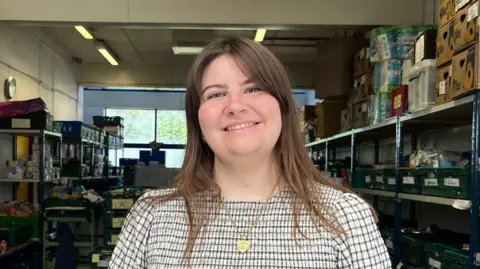The increasing demand for food assistance is a pressing issue globally, and the Cambridge City Foodbank has recently reported a significant surge in the number of individuals relying on their services. This surge is alarming, and the statistics paint a stark picture: last year alone, the foodbank distributed an unprecedented total of 17,666 emergency food parcels, a staggering 20% increase compared to the preceding year, 2023. Such figures highlight a growing crisis surrounding food insecurity in what is often perceived as a prosperous region.
At the heart of this issue lies a complex interplay of factors, with economic pressures often cited as the primary contributor. Many families are facing dire financial situations, resulting in parents going without meals so their children can eat adequately. This has become a common theme, with reports of individuals stretching the use of a single tea bag over an entire week in a desperate attempt to conserve resources. Kate McIntosh, the senior organizer of the foodbank, emphasizes that the hunger experienced by many is not merely a matter of scarcity but rather a significant income-related dilemma.
The foodbank serves as a vital resource for those in need, offering packages that are designed to sustain households for three days. However, as Ms. McIntosh pointed out, the system is becoming increasingly strained as more people seek assistance. While the community’s generosity plays a crucial role in stocking the foodbank’s shelves, the rising number of users means that the foodbank has to stretch its resources further than ever before.
Visitors to the foodbank receive nutritionally balanced food parcels; nonetheless, the issue extends beyond mere access to food. Ms. McIntosh states that many of the individuals who turn to the foodbank often feel the weight of stigma, leading them to initially forgo help for extended periods. This highlights a problematic cycle where individuals endure prolonged hunger out of a reluctance to seek assistance, compounded by the fear of being judged.
Moreover, the statistics regarding food insecurity are disheartening: 86% of those experiencing such crisis do not seek help due to various barriers, including feelings of shame and the misconception that they should manage their hardships alone. Ms. McIntosh brings attention to the fact that many of the foodbank’s users are first-time visitors, indicating that economic hardships are affecting individuals who might have previously been self-sufficient.
A significant aspect of the food insecurity crisis in Cambridge is that people are faced with impossible choices, often deciding between paying for necessary household expenses like heating or procuring food. The intricacies of budgeting in such challenging economic conditions can be overwhelming, leaving many families in vulnerable positions.
The role of the Cambridge City Foodbank extends beyond simply dispensing food. The organization recognizes its responsibility to offer support and assistance, and they are committed to continuing their services for as long as they are needed. However, the foodbank’s operational model raises concerns. Currently, a significant portion of their supplies is being purchased, a situation deemed “unsustainable” by the organizers.
As the need for services grows, the Cambridge City Foodbank must navigate the ongoing tensions between demand and the resources available to meet that demand. It has become increasingly apparent that changing economic conditions and rising living costs are challenges that cannot merely be addressed by charitable efforts alone; they demand systemic change and comprehensive support initiatives to ensure that basic human needs are met without stigma and shame.
The overall scenario presented by the Cambridge City Foodbank serves as a poignant reminder of food insecurity and the broader socio-economic issues that many people face today. It underscores the urgent requirement for community initiatives, policy changes, and broader outreach efforts that not only alleviate hunger but also address the underlying causes of poverty and food scarcity. As Cambridge continues to evolve, ensuring that no one is left behind amid growing economic strains is a challenge that will need collective attention and action.



